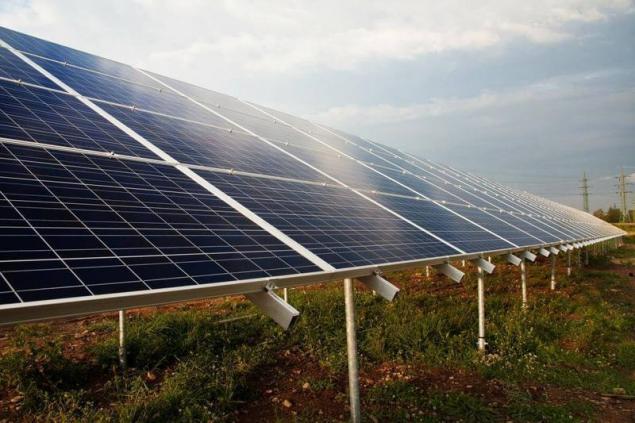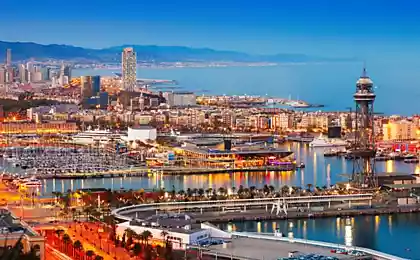541
7 climate records were broken in 2016
It is already clear that 2016 will be the warmest year on climate statistics, it is not surprising that many climate records were set this year. Fortunately, thanks to the implementation of the Paris accords ( which also, incidentally, set a record for number of countries, which also signed the joint document on April 22) we can talk about the greatest victory in our struggle for a bright, sustainable future.
But before you open the champagne, let's analyze those climate records that were set this year. Them to seven. I hope that by the end of the year, we won't have anything to tell you in this regard.
1. The number of storms broke all statistical records.
In 2016, at least 4 major storm, characterized by "a high probability of annual complication of the situation" – i.e. natural disaster – for example, the huge amount of rain, or a flood – or less than 0.2 % of precipitation, brought by heavy rains in Mississippi, West Virginia, Maryland and Louisiana. These phenomena are examined over a period of 500 years or more. Heavy rainfall and flooding of this kind are associated with increasing global temperatures, causing increased evaporation from large water surfaces and the atmosphere, which becomes warmer it can hold more moisture. If global temperatures continue to rise, we are faced with new manifestations of global natural disasters.

2. The disappearance of species
Scientists believe that for the first time in the monitored period, anthropogenic climate change may be the cause of the possible extinction of such species as banana rats. Small rodents that live exclusively around the island of bramble in the Torres Strait, Australia. These rodents live only on the island of bramble around Australia and they are in a critical situation, when rising as a result of extreme weather conditions, the sea level flooded the island with saltwater.
3. Levels of carbon dioxide emissions were a record low this year
In September of the current year the level of carbon dioxide in the atmosphere were higher than 1.5 kg/m, in line with scientists ' predictions, it never drops below this otoki at least in our lifetime. Surprisingly, the level of carbon dioxide emissions remained so low throughout September given that the annual emissions did not change. However, this was expected, because people throw all much more carbon dioxide into the atmosphere than plants are able to absorb. This will lead to increase in global temperatures, because the more carbon in the atmosphere, the less solar energy will be able to go back into space.
4. Sea ice is melting faster Arktiki
Arctic sea ice reached a record low this year on September 10, the second according to calculations by NASA and the national Center according to the snowfall and glaciation compared to 2007. According to information from the satellites, the total area of sea ice made up 1.60 million square miles (4.14 million sq km). The average area of Arctic sea ice in a month decreased significantly compared with 1978, when they started regular measurements. But the Arctic ice not only affects the temperature of the planet, but also on the community of polar animals, ecosystems and the swirl of the currents in the ocean.
5. A record warm August
August 2016 was the warmest according to NASA estimates for the ongoing study of global temperatures for 136 years. The temperature in August 2016 was 0.16 degrees Celsius higher than the previous record (2014) despite the fact that the hottest month was July 2016. August was the 11th consecutive month with record high temperatures.
6. 2016 may be the hottest year in history
Now 2016 may seem to be the hottest year on record, according to estimates of the UN's World Meteorological Organization. “Another month, another record. And again. And again. Decades of prevailing trends in the weather reaches its peak.” Says petteri Taalas, the Secretary-General of the world meteorological organization. 7. The only record to be proud of: solar energy is booming in 2016
In the US for 2 years plan to install 2 million solar systems. In the second quarter of 2016, the solar industry installed 2,051 MW of solar panels – for 43% more than a year ago. This is a record for the quarter, as the number of solar systems can supply energy to more than 6.2 million homes and reduce hydrocarbon emissions by 37 million tons per year. “We are at the beginning of the unprecedented growth that will take place during the second half of 2016 – said Haniman Gori, the Deputy Director of the Agency GTM Research solar energy USA “the Second half of this year and the first half of 2017 pobyut all records for installing solar panels. ”

Around the world, the drop in prices of solar energy makes it more competitive compared to fossil energy. In the UAE, a Japanese scientist recently had an idea, bro to build a solar panel for the price of just 2.91 cents per kilowatt/hour for solar plant in Chile. Carlos Finat, Director of the Chilean Association for Renewable Energy (Chilean Renewable Energies Association), said that the Chilean tender – is a serious claim that the energy of the country is in a stage of transition to vozobnovlenie energy and companies must quickly adapt to the demands of this transition.”
What now?
To such records was not exceeded before the end of the current year and in the coming years, we must all do everything we can and to ask our leaders to make decisions regarding climate change, renewable energy and reality. published
Source: cleantechnica.com/2016/10/18/7-climate-change-records-broken-2016/
But before you open the champagne, let's analyze those climate records that were set this year. Them to seven. I hope that by the end of the year, we won't have anything to tell you in this regard.
1. The number of storms broke all statistical records.
In 2016, at least 4 major storm, characterized by "a high probability of annual complication of the situation" – i.e. natural disaster – for example, the huge amount of rain, or a flood – or less than 0.2 % of precipitation, brought by heavy rains in Mississippi, West Virginia, Maryland and Louisiana. These phenomena are examined over a period of 500 years or more. Heavy rainfall and flooding of this kind are associated with increasing global temperatures, causing increased evaporation from large water surfaces and the atmosphere, which becomes warmer it can hold more moisture. If global temperatures continue to rise, we are faced with new manifestations of global natural disasters.

2. The disappearance of species
Scientists believe that for the first time in the monitored period, anthropogenic climate change may be the cause of the possible extinction of such species as banana rats. Small rodents that live exclusively around the island of bramble in the Torres Strait, Australia. These rodents live only on the island of bramble around Australia and they are in a critical situation, when rising as a result of extreme weather conditions, the sea level flooded the island with saltwater.
3. Levels of carbon dioxide emissions were a record low this year
In September of the current year the level of carbon dioxide in the atmosphere were higher than 1.5 kg/m, in line with scientists ' predictions, it never drops below this otoki at least in our lifetime. Surprisingly, the level of carbon dioxide emissions remained so low throughout September given that the annual emissions did not change. However, this was expected, because people throw all much more carbon dioxide into the atmosphere than plants are able to absorb. This will lead to increase in global temperatures, because the more carbon in the atmosphere, the less solar energy will be able to go back into space.
4. Sea ice is melting faster Arktiki
Arctic sea ice reached a record low this year on September 10, the second according to calculations by NASA and the national Center according to the snowfall and glaciation compared to 2007. According to information from the satellites, the total area of sea ice made up 1.60 million square miles (4.14 million sq km). The average area of Arctic sea ice in a month decreased significantly compared with 1978, when they started regular measurements. But the Arctic ice not only affects the temperature of the planet, but also on the community of polar animals, ecosystems and the swirl of the currents in the ocean.
5. A record warm August
August 2016 was the warmest according to NASA estimates for the ongoing study of global temperatures for 136 years. The temperature in August 2016 was 0.16 degrees Celsius higher than the previous record (2014) despite the fact that the hottest month was July 2016. August was the 11th consecutive month with record high temperatures.
6. 2016 may be the hottest year in history
Now 2016 may seem to be the hottest year on record, according to estimates of the UN's World Meteorological Organization. “Another month, another record. And again. And again. Decades of prevailing trends in the weather reaches its peak.” Says petteri Taalas, the Secretary-General of the world meteorological organization. 7. The only record to be proud of: solar energy is booming in 2016
In the US for 2 years plan to install 2 million solar systems. In the second quarter of 2016, the solar industry installed 2,051 MW of solar panels – for 43% more than a year ago. This is a record for the quarter, as the number of solar systems can supply energy to more than 6.2 million homes and reduce hydrocarbon emissions by 37 million tons per year. “We are at the beginning of the unprecedented growth that will take place during the second half of 2016 – said Haniman Gori, the Deputy Director of the Agency GTM Research solar energy USA “the Second half of this year and the first half of 2017 pobyut all records for installing solar panels. ”

Around the world, the drop in prices of solar energy makes it more competitive compared to fossil energy. In the UAE, a Japanese scientist recently had an idea, bro to build a solar panel for the price of just 2.91 cents per kilowatt/hour for solar plant in Chile. Carlos Finat, Director of the Chilean Association for Renewable Energy (Chilean Renewable Energies Association), said that the Chilean tender – is a serious claim that the energy of the country is in a stage of transition to vozobnovlenie energy and companies must quickly adapt to the demands of this transition.”
What now?
To such records was not exceeded before the end of the current year and in the coming years, we must all do everything we can and to ask our leaders to make decisions regarding climate change, renewable energy and reality. published
Source: cleantechnica.com/2016/10/18/7-climate-change-records-broken-2016/
In Europe, a set of innovative charging stations of electric vehicles
How to recognize that you are too much give























